The human resources (HR) landscape is undergoing a significant transformation, driven by the rapid advancement of artificial intelligence (AI). From automating routine tasks to providing data-driven insights, AI is reshaping the way HR professionals work and interact with employees. This article delves into the impact of AI on HR jobs and tasks, exploring both the opportunities and challenges it presents.
Automating Repetitive Tasks
One of the most immediate impacts of AI in HR is the automation of repetitive and time-consuming tasks. This includes activities like:
- Resume Screening: AI-powered tools can scan resumes and identify candidates who meet specific criteria, reducing the time spent on manual screening by HR professionals.
- Scheduling Interviews: AI chatbots can handle the scheduling of interviews, freeing up HR personnel to focus on more strategic tasks.
- Onboarding New Hires: AI chatbots can provide new hires with essential information and answer their questions during the onboarding process.
- Payroll Processing: AI can automate payroll calculations and deductions, ensuring accuracy and efficiency.
By automating these tasks, AI frees up HR professionals to focus on more strategic initiatives, such as talent management, employee engagement, and organizational development.
Enhancing Decision-Making with Data
AI is not just about automating tasks; it’s also about providing valuable insights to inform decision-making. AI-powered analytics tools can analyze vast amounts of HR data to identify trends and patterns. This data can be used to:
- Improve Hiring Accuracy: AI can analyze past hiring data to identify the characteristics of successful employees and predict which candidates are most likely to be successful in a particular role.
- Reduce Employee Turnover: AI can analyze employee sentiment and identify factors that contribute to employee dissatisfaction, allowing HR to take proactive steps to prevent turnover.
- Develop Targeted Training Programs: AI can identify skills gaps within the workforce and develop targeted training programs to address those needs.
- Optimize Workforce Planning: AI can predict future staffing needs based on business growth and changing market conditions.
By leveraging data-driven insights, HR professionals can make more informed decisions that improve the overall effectiveness of the HR function.
How to Make HR Policies More Transparent and Accessible
The Human Touch in a Digital Age
While AI is transforming HR, it’s important to remember that the human touch will always be essential. AI cannot replace the empathy, understanding, and critical thinking skills that are crucial for building strong relationships with employees and fostering a positive workplace culture.
HR professionals need to develop new skills and competencies to thrive in this AI-powered HR landscape. These skills include:
- Data Literacy: The ability to understand and interpret data is essential for making data-driven decisions.
- Analytical Thinking: The ability to identify trends and patterns in data is crucial for problem-solving and decision-making.
- Critical Thinking: The ability to critically evaluate the outputs of AI systems and make informed decisions based on both data and human judgment.
- Change Management: The ability to effectively manage the change process as AI is implemented in the HR function.
By developing these skills, HR professionals can ensure that they remain relevant and valuable in the evolving HR landscape.
The Future of HR with AI
The future of HR with AI is full of possibilities. As AI technology continues to evolve, we can expect to see even more innovative applications in the HR domain. Some potential future applications of AI in HR include:
- Personalized Employee Experiences: AI can be used to personalize the employee experience, from onboarding and training to performance management and career development.
- Predictive Talent Analytics: AI can be used to predict employee performance, engagement, and risk of turnover, allowing HR to take proactive steps to address potential issues.
- Augmented Reality (AR) and Virtual Reality (VR) in HR: AR and VR can be used for employee training, onboarding, and performance evaluation, creating immersive and engaging experiences.
While the full potential of AI in HR is still being explored, it is clear that AI is here to stay and will continue to transform the way HR professionals work and interact with employees. By embracing AI and developing the necessary skills, HR professionals can ensure that they are well-positioned to thrive in the future of work.
Conclusion
The AI revolution in HR is creating both opportunities and challenges for HR professionals. By understanding the impact of AI on HR jobs and tasks, and by developing the necessary skills and competencies, HR professionals can ensure that they remain relevant and valuable in the evolving HR landscape. The future of HR is bright, and AI is poised to play a key role in shaping the future of work.
FAQs
Q: What is AI and how is it impacting HR?
Ans: AI is artificial intelligence, and it’s affecting HR by automating tasks, providing data-driven insights, and changing the nature of HR jobs.
Q: Is AI going to replace HR professionals?
Ans: No, AI is not replacing HR professionals; it’s augmenting their work by freeing them from repetitive tasks and allowing them to focus on more strategic initiatives.
Q: What are the benefits of using AI in HR?
Ans: Some benefits include increased efficiency, better decision-making, improved talent management, and reduced costs.
Q: What are the challenges of using AI in HR?
Ans: Challenges include concerns about bias, ethical considerations, the need for data privacy, and the need for HR professionals to develop new skills.
Q: What HR tasks can be automated with AI?
Ans: Examples include resume screening, scheduling interviews, onboarding new hires, payroll processing, and employee benefits administration.
Q: Will I lose my job if my HR tasks are automated?
Ans: This is unlikely. Automation will free up HR professionals to focus on more strategic tasks that require human skills like empathy, critical thinking, and relationship building.
Q: What will HR look like in the future with AI?
Ans: We can expect HR to become more data-driven, personalized, and proactive. AI will play a key role in creating immersive employee experiences, predicting future needs, and shaping the future of work.
Q: What skills do HR professionals need to succeed in the future?
Ans: HR professionals need to develop skills in data literacy, analytical thinking, critical thinking, change management, and staying up-to-date with the latest AI technologies.
You May Read Also :



